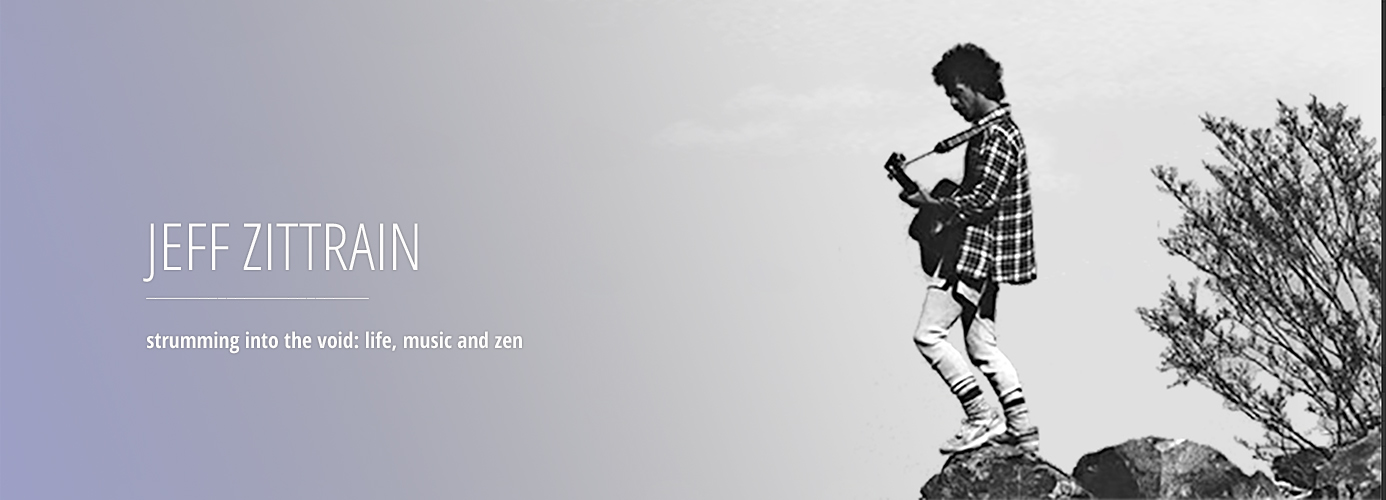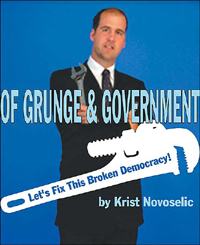
I recently saw Krist Novoselic, the former bass player for Nirvana, at a reading promoting his book “Of Grunge and Government: Let’s Fix this Broken Democracy.”
It’s an interesting book and a quick read. Highly relevant to this column is his explanation of his disappointment with the 90’s drug culture:
“To many stoners, marijuana was more about escapism than real liberation. If anything, “drop out” was the only relevant term left of Timothy Leary’s famous axiom, “Turn on, tune in, drop out.” The stoner message was: “Don’t expect anything from me.” It was a counterculture without a mission.”
Novoselic gets it right when he goes old school – back to Dr. Leary – to whom turning on also meant tuning in. And he’s right also that “tuning in” means experiencing a larger perspective, spiritual or cosmic, which provides not mere escapism but real liberation.
Leary’s first collection of articles was called “The Politics of Ecstasy”. Look at the title – he certainly doesn’t give short shrift to either the high or social engagement. Apparently, neither did a lot of people back then. As Tom Robbins says in the introduction, “In the Sixties virtually all political activism was connected, directly or indirectly, to the ingestion of psychedelic drugs and therefore was shaped by, if not centered in, ecstatic states of being.”
How could this be? As we ask over and over again in this column, what is the connection between the high (of jams, drugs or visions) and politics? Look first at Leary’s own explanation of psychedelia:
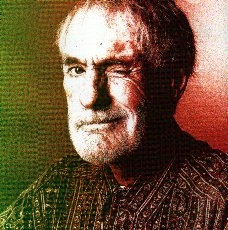
The word psychedelic means ecstatic or mind-opening…the highly skilled, self-confident free-agent who has renounced vassal, liege service to a Lord.
The good doctor Leary…
“The word psychedelic means ecstatic or mind-opening…the highly skilled, self-confident free-agent who has renounced vassal, liege service to a Lord.”
Individual freedom. Rebellion with a cause – “Emancipate yourselves from mental slavery” Bob Marley sang – so you can be the beginning of a better world.
Bob Marley may be reggae’s greatest product, but the genre exists beyond him. When Keith Richards called 1973’s “The Harder They Come” (on which Bob Marley doesn’t appear) one of the greatest rock records of all time, he understood its social context. Reggae, along with its integral celebration of pot, achieves its power not from frat-style partying, but from its political and spiritual aspirations.
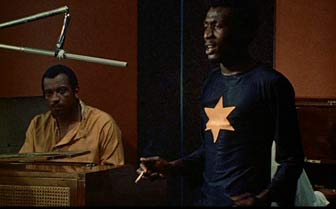
I’d rather be a free man in my grave, than livin’ as a puppet or a slave…
Jimmy Cliff, The Harder They Come 1973
The same with rock and roll, at least in the beginning. Early rock and roll, embodied in Chuck Berry, Little Richard, and Elvis, was an explosive social phenomenon because of the way it broke down racial and sexual boundaries in the repressive Eisenhower 50’s. Chuck Berry took great pride in this, famously saying to Carl Perkins “We’re doing more than our leaders in Washington to break down the barriers.”
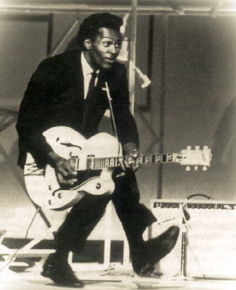
Chuck Berry, duckwalking down the 1950s barriers…
Breaking down barriers, both personally and societally, is I think the mission of the rebellion, the mind-opening freedom of rock music. The music would continue this process, even as it evolved musically, thematically and technically for the next two decades. “Tear down the Wall!” Pink Floyd climaxed the seventies in their 1980 art-rock masterpiece, literally building and then destroying a huge wall in concert.
In fact, in 1990, Floyd bassist and Wall mastermind Roger Waters would bring individual freedom together with politics in a way that seemed to finally affirm once and for all and beyond a doubt the real-world relevance of rock music, when he performed “The Wall” in Berlin, one short year after the Berlin Wall came down. He even used actual bricks of that wall to destroy at the end of the show.

(A rather preppy) Roger Waters faces another Floyd-ish Wall in the real world, this one a barrier between Israel and the Palestinian Territories, 2006
Unfortunately, the concert, at least on DVD, is kind of disappointing. Maybe it’s because society likes to take the bite out of all its critiques as they get assimilated into the mainstream – they become mere entertainment. (The escapism became quite literal when Marley’s prayer of “One Love” was turned into a travel advertisement). As I mentioned in an earlier column, this happened to Woody Guthrie, Mark Twain, and John Steinbeck. And Kurt Cobain felt it happening with Nirvana, complaining on the liner notes to “Insesticide” that he didn’t want homophobes, racists, and other closed-minded people to be Nirvana fans.
But they were, and we meet the new boss, same as the old boss. Plus ca change, plus c’est la meme chose (if you don’t know French, try Neil Peart…)
Still, breaking down barriers artistically can inspire us to break them down in real life. One of the most striking things about seeing Novoselic speak is his enthusiasm for political change, his genuine excitement about electoral reform and the minute details of things such as redistricting and full representation. And ironically, unlike Kurt Cobain, he finds cause for optimism, not despair, in the mainstream success of Nirvana; in fact, he applies his front seat view of the rise of grunge to hope for political change.
“The political system in the USA is long overdue for reform. Things are not moving. This is the kind of condition where a spark for change can ignite. I’ve seen the music world turned around from an inside perspective: The genesis of the change in 1991 came from individuals who refused to accept the status quo and made their own way. Music and politics are similar because they are both about people coming together.”
Look at the wheel of history by considering the following anthemic statements:
“We are stardust, we are golden” – Joni Mitchell – 1969
“I feel stupid and contagious” – Kurt Cobain – 1992
“The cycle of reinvention, in the context of the human experience, can be seen as a search for meaning…Let us look to our fundamentals of freedom, inclusion, and fairness. If we wrap these principles with innovation, we can continue down the path our founders embarked on some 228 years ago.” – Krist Novoselic – 2004
Cyclical or not, the times they are a-changing.
